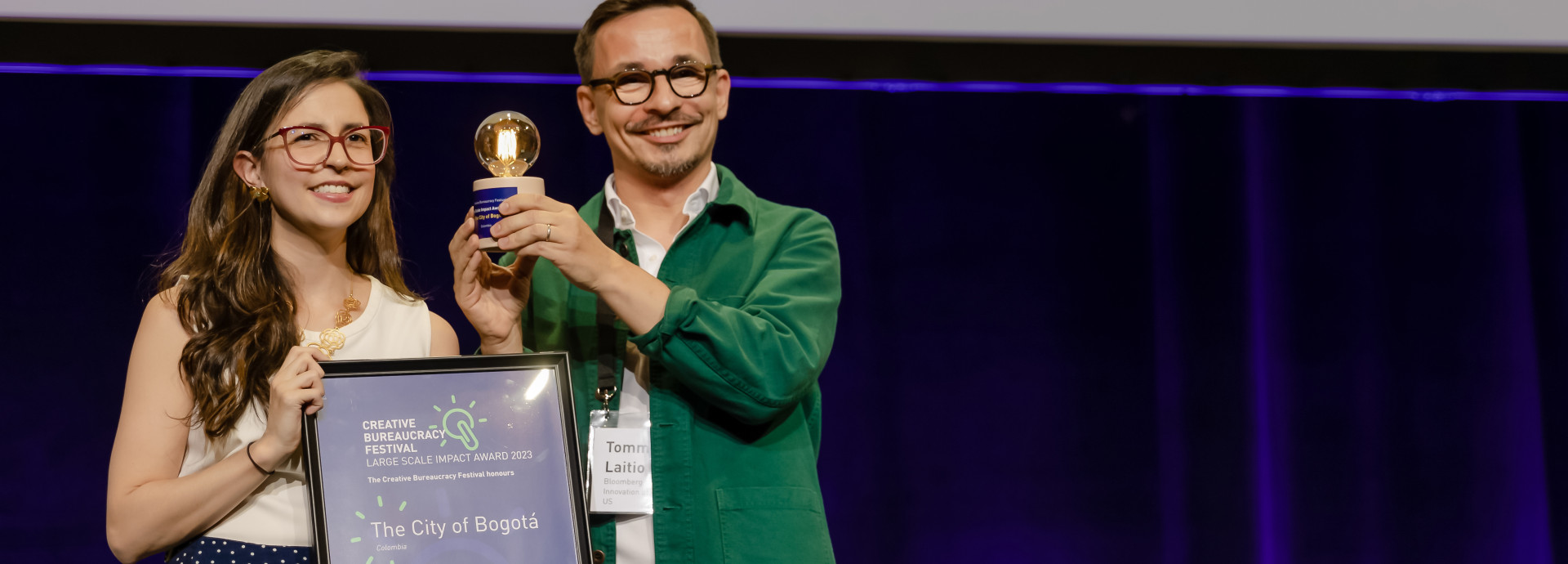
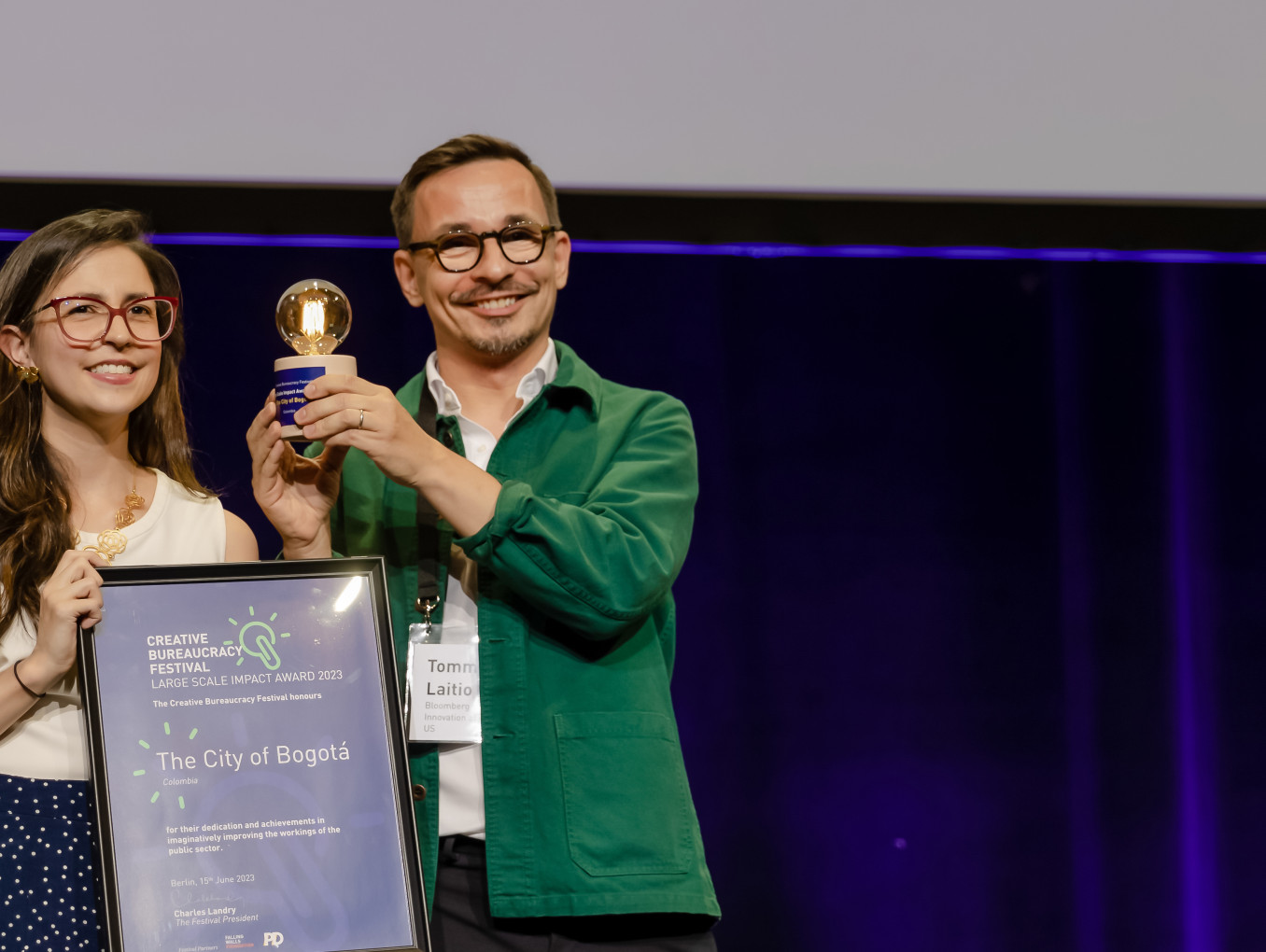
Creative Bureaucracy Festival Award Recipients
Award Recipients 2023-2018
Award 2023
LARGE SCALE IMPACT AWARD
The City of Bogotá, represented by Angela Reyes
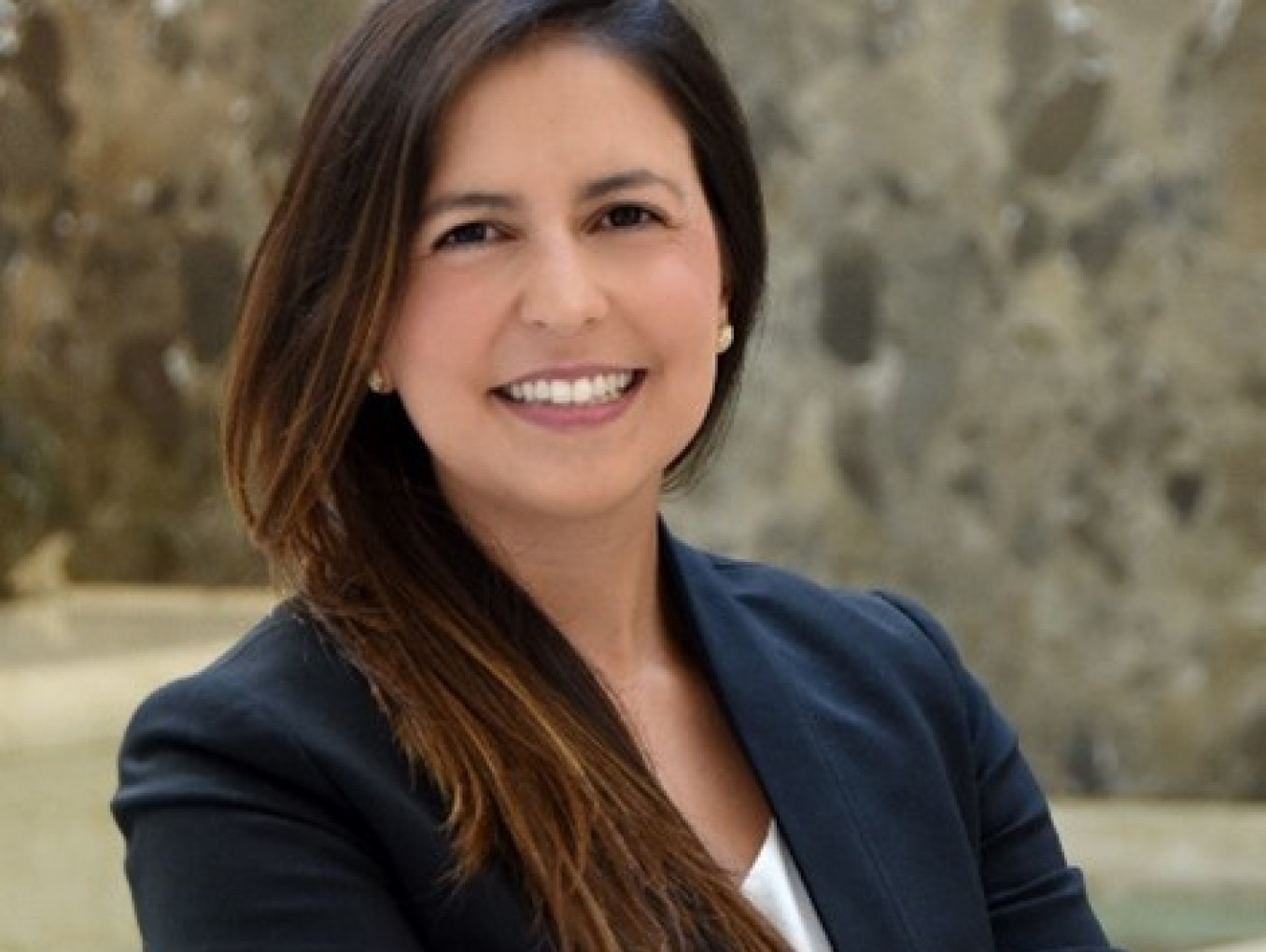

Awarded to the City of Bogotá for its continual innovative capacity across time which has embedded imagination within its citymaking. This is best exemplified most recently by the city’s pioneering Care System, the first urban master plan that places caregivers at the centre of policy and service delivery design. Angela Reyes is lead for digital transformation in the Bogotá innovation team. Her project focuses on developing digital tools to support the city’s care blocks program (Sistema Distrital del Cuidado – SIDICU). The Bogotá care blocks program is a $4.5B investment that identifies services and links them to measurable social change as key to reducing women’s disproportionate care burden and reorganizing government to ensure women have equitable opportunities to thrive.


Awarded to the City of Bogotá for its continual innovative capacity across time which has embedded imagination within its citymaking. This is best exemplified most recently by the city’s pioneering Care System, the first urban master plan that places caregivers at the centre of policy and service delivery design. Angela Reyes is lead for digital transformation in the Bogotá innovation team. Her project focuses on developing digital tools to support the city’s care blocks program (Sistema Distrital del Cuidado – SIDICU). The Bogotá care blocks program is a $4.5B investment that identifies services and links them to measurable social change as key to reducing women’s disproportionate care burden and reorganizing government to ensure women have equitable opportunities to thrive.
INNOVATOR OF THE YEAR AWARD
Eric Hubbard
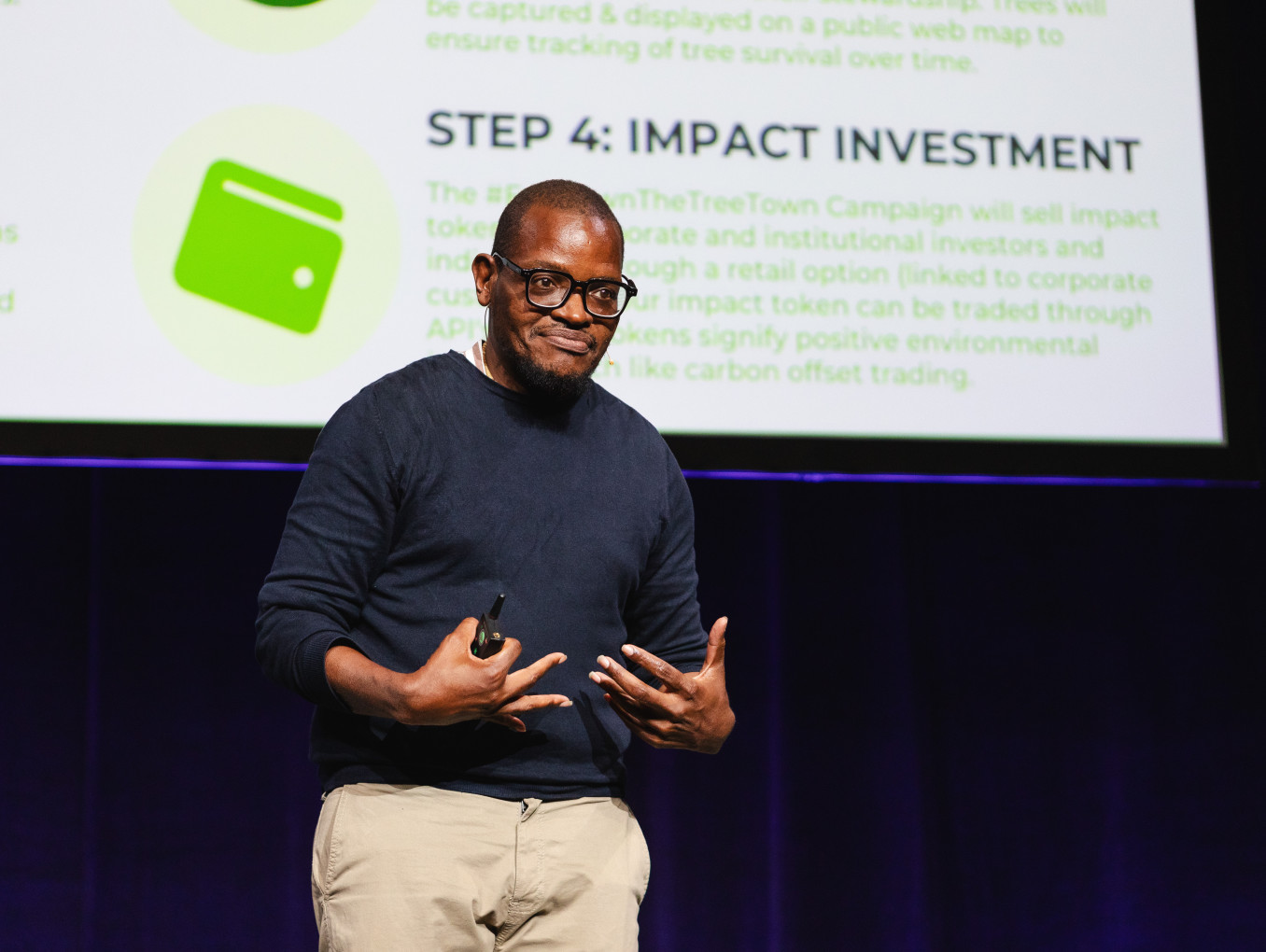

The City of Freetown in Sierra Leone is exposed to extreme climate vulnerabilities due to uncontrolled deforestation and rapid urban expansion. Eric Hubbard has served as senior advisor to the Mayor of Freetown since 2019, where he has guided the design and implementation of several projects tackling climate adaptation and mitigation head on. This includes the #FreetownTheTreeTown campaign to plant, digitally track and grow 1 million trees by 2023—an effort that would increase the city’s vegetation cover by 50%. What makes this initiative especially innovative? Firstly the #FreetownTheTreeTown campaign puts change at scale in the hands of local communities:


The City of Freetown in Sierra Leone is exposed to extreme climate vulnerabilities due to uncontrolled deforestation and rapid urban expansion. Eric Hubbard has served as senior advisor to the Mayor of Freetown since 2019, where he has guided the design and implementation of several projects tackling climate adaptation and mitigation head on. This includes the #FreetownTheTreeTown campaign to plant, digitally track and grow 1 million trees by 2023—an effort that would increase the city’s vegetation cover by 50%. What makes this initiative especially innovative? Firstly the #FreetownTheTreeTown campaign puts change at scale in the hands of local communities:
Eric helped to conceive and design a “community growing model”, where reforestation is co-designed, co-managed and co-owned by the community and the city government at every stage. Secondly, in the design of the #FreetownTheTreeTown initiative, Eric has managed to embed long-term thinking into a system that is designed by short-term thinking. Most tree planting campaigns are ineffective over time and at scale because they neglect maintenance. Eric started with maintenance, which allowed him to think about the long term financial sustainability of the initiative. This reframe led to the creation of a pioneering, self-sustaining financing model that blends sources of finance and digital innovation. It could be replicated to scale urban nature-based solutions in other under-resourced cities.
POWER SHIFTER AWARD
Kristina Lunz


Kristina Lunz is the founder of the Centre for Feminist Foreign Policy. The CFFP actively addresses topics and systems where the current status is rooted in patriarchal values and perpetuates systemic violence through capitalism, imperialism, and colonialism. These systems negatively impact different people in different ways based on their gender, race, ethnicity, class, socioeconomic status, sexuality, and more. Feminist foreign policy is a means to rebalance the power inequalities which perpetuate this oppression. It does so by providing a political framework which is informed by the everyday experiences and needs of people who feel the consequences of policy decisions.


Kristina Lunz is the founder of the Centre for Feminist Foreign Policy. The CFFP actively addresses topics and systems where the current status is rooted in patriarchal values and perpetuates systemic violence through capitalism, imperialism, and colonialism. These systems negatively impact different people in different ways based on their gender, race, ethnicity, class, socioeconomic status, sexuality, and more. Feminist foreign policy is a means to rebalance the power inequalities which perpetuate this oppression. It does so by providing a political framework which is informed by the everyday experiences and needs of people who feel the consequences of policy decisions.
LEGACY AWARD
Jaime Lerner
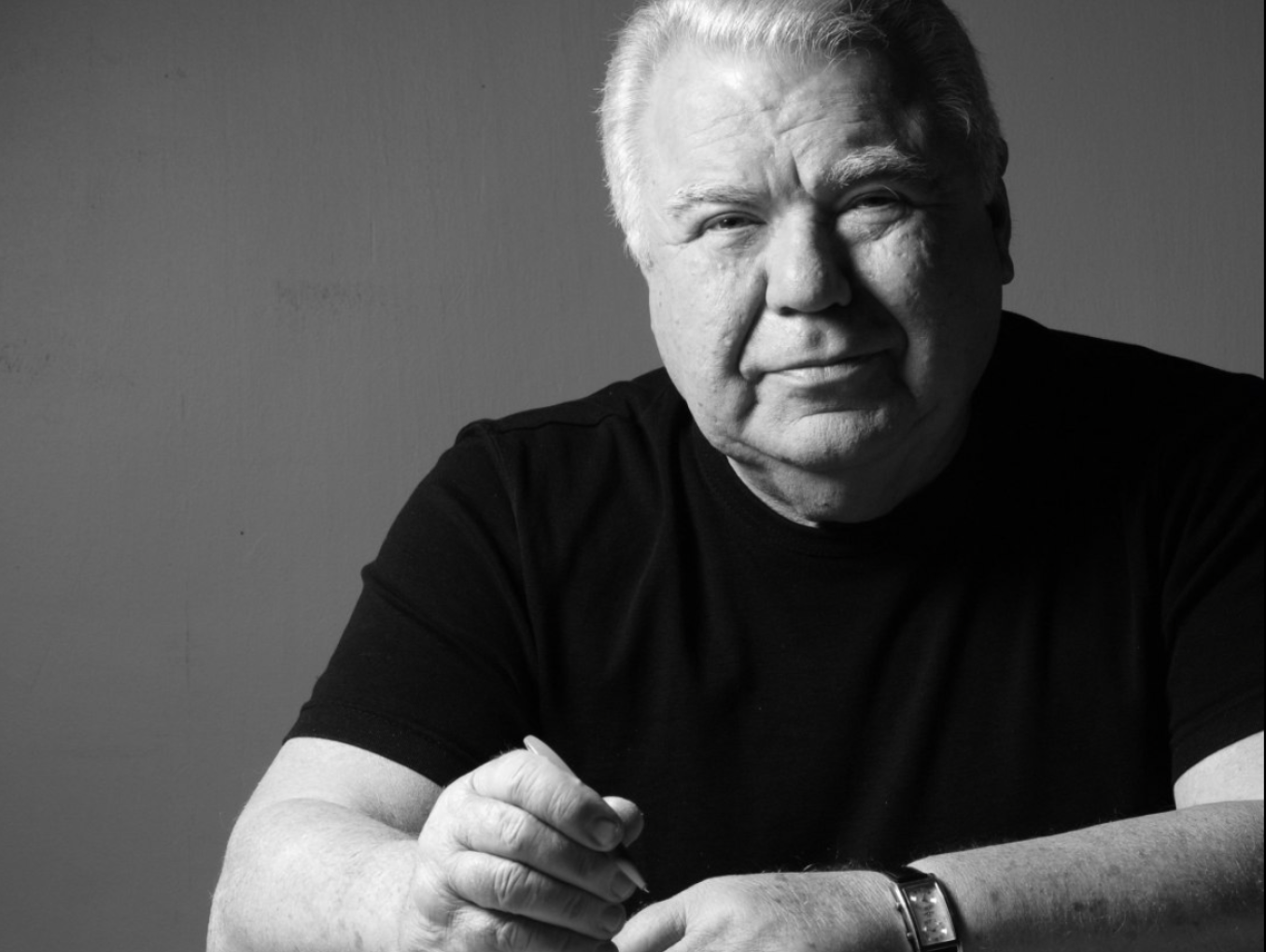

As the chief architect of the Curitiba Master Plan, he was appointed mayor during Brazil’s military dictatorship in 1971. When the nation returned to democracy, he was elected to another term. During his 12 years in office, Lerner devised many of Curitiba’s innovative, inexpensive solutions to city problems. For instance, in the early days of the public transit system, to increase its funding and encourage ridership, he made a special city lottery, valuing bus fare as lottery tickets. To combat Curitiba’s growing litter problem, he created more incentives for recycling, including exchanging bottles, cans and other recyclables for food.


As the chief architect of the Curitiba Master Plan, he was appointed mayor during Brazil’s military dictatorship in 1971. When the nation returned to democracy, he was elected to another term. During his 12 years in office, Lerner devised many of Curitiba’s innovative, inexpensive solutions to city problems. For instance, in the early days of the public transit system, to increase its funding and encourage ridership, he made a special city lottery, valuing bus fare as lottery tickets. To combat Curitiba’s growing litter problem, he created more incentives for recycling, including exchanging bottles, cans and other recyclables for food.
Lerner believed in implementing plans swiftly — in just 72 hours, he converted the city’s downtown into Brazil’s first pedestrian mall. Jaime Lerner passed away in 2021. Learn more about Lerner’s life and legacy here.
Award 2022
Mykhailo Fedorov,
Vice Prime Minister of Ukraine and Minister of Digital Transformation
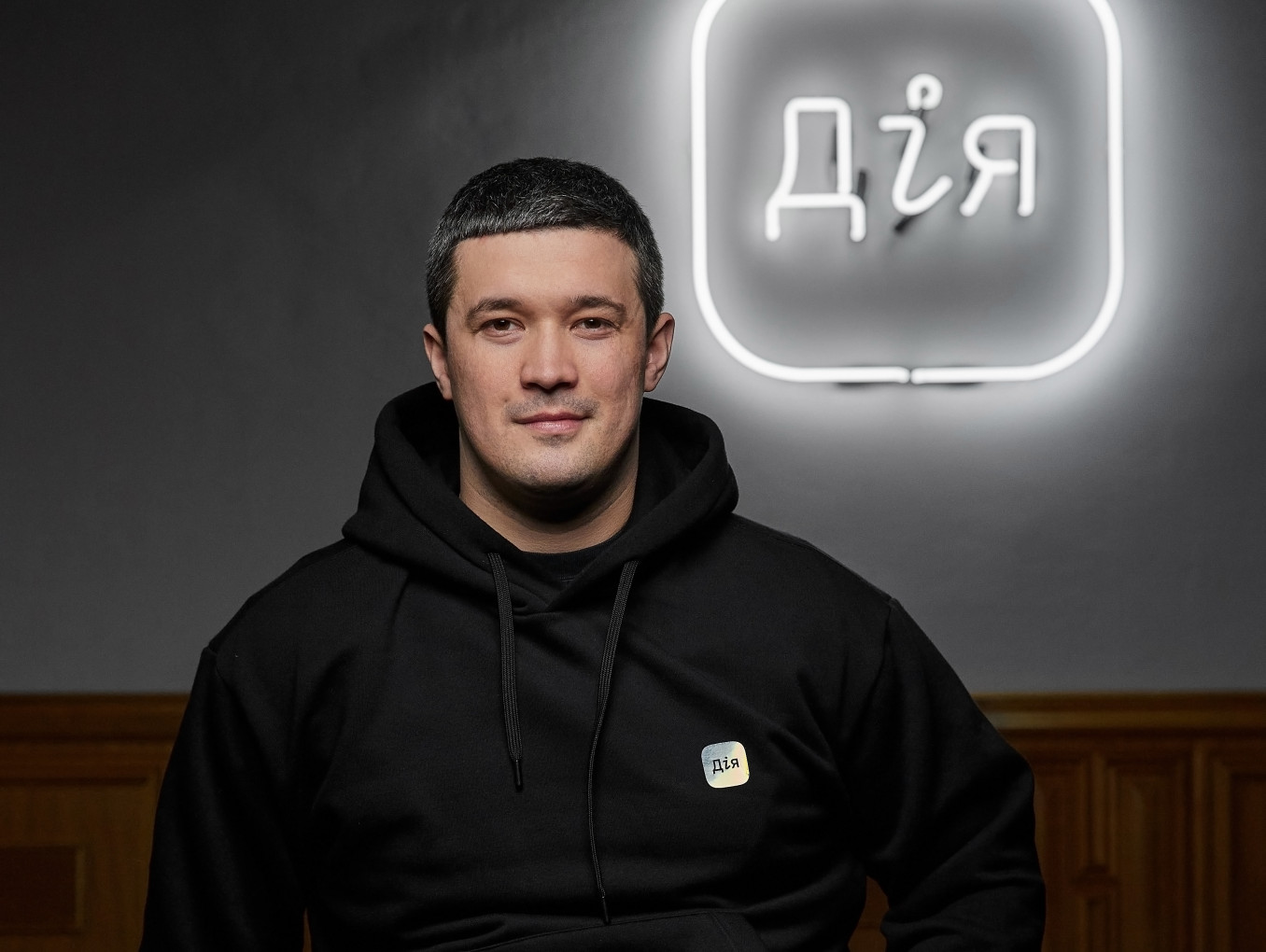

Mykhailo Fedorov is the driving force behind the process of digitalizing the Ukrainian administration. With his vision of “A state in a Smartphone”, he started major reforms aiming towards full and easy digital participation and accessibility of state services. He set up legislative frameworks and strengthened technical capabilities of the state, while ensuring data protection. He established a new philosophy of providing e-services in a comprehensive and breakthrough framework and made Ukraine more attractive for businesses and start-ups. He implemented free digital education programmes for parents, teachers and civil servants. And in doing so, he vitally strengthened Ukraine’s digital resources crucial for the defense of his country.


Mykhailo Fedorov is the driving force behind the process of digitalizing the Ukrainian administration. With his vision of “A state in a Smartphone”, he started major reforms aiming towards full and easy digital participation and accessibility of state services. He set up legislative frameworks and strengthened technical capabilities of the state, while ensuring data protection. He established a new philosophy of providing e-services in a comprehensive and breakthrough framework and made Ukraine more attractive for businesses and start-ups. He implemented free digital education programmes for parents, teachers and civil servants. And in doing so, he vitally strengthened Ukraine’s digital resources crucial for the defense of his country.
“The Ministry of Digital Transformation of Ukraine from the very first day of its establishment in September 2019 is aimed at fighting bureaucracy, queues at gov offices and tonnes of ridiculous paperwork. We bring a brand new vision and approaches on how the state should interact with citizens. The state must serve its people; not being a tough monster and burden. I guess we succeeded in it: we simplify public services by making everything possible digitally. As well as everything that is considered impossible – we also managed to transfer online. That’s the point where you need a creative state of mind and a pro-active position. Full-scale war confirmed once again: simple solutions require bravery, not being afraid to fail and creative people. My team is exactly like that.“ – Mykhailo Fedorov
Kotchakorn Vorrakhom,
Landscape Architect, CEO and Founder of Landprocess
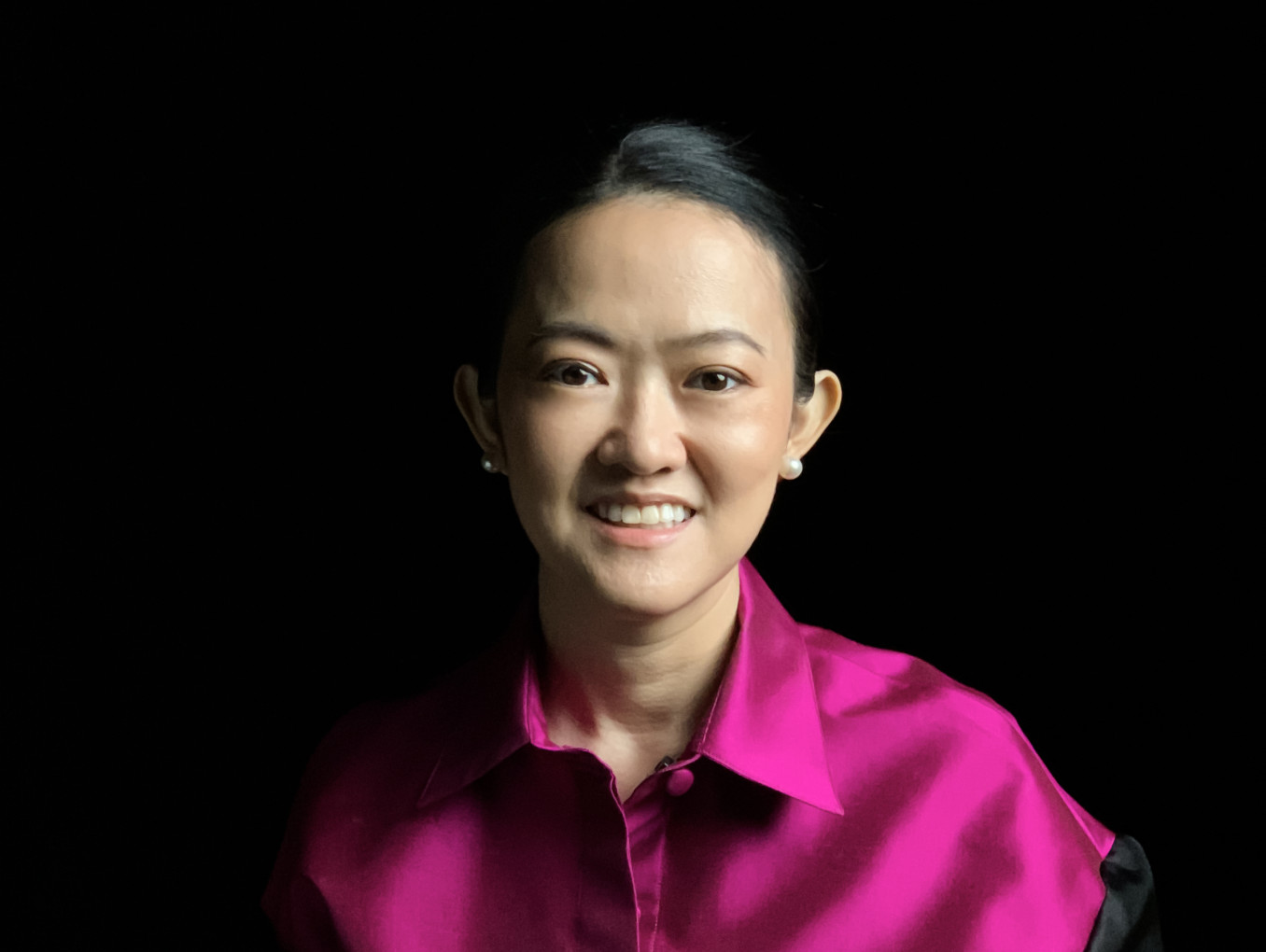

Kotchakorn Voraakhom is a renowned landscape architect and CEO of Thailand-based Landprocess, which addresses Bangkok’s vulnerability to climate change. With normal green spaces no longer enough, Landprocess focuses on enhancing landscapes for carbon storage such as urban forests, green roofs, and redesigning concrete surfaces to improve public health and adaptability to climate change. Kotchakorn Voraakhom was named to TIME Magazine’s list of 100 rising stars shaping the world’s future. She also chairs the Climate Change Working Group of the International Federation of Landscape Architects (IFLA World).


Kotchakorn Voraakhom is a renowned landscape architect and CEO of Thailand-based Landprocess, which addresses Bangkok’s vulnerability to climate change. With normal green spaces no longer enough, Landprocess focuses on enhancing landscapes for carbon storage such as urban forests, green roofs, and redesigning concrete surfaces to improve public health and adaptability to climate change. Kotchakorn Voraakhom was named to TIME Magazine’s list of 100 rising stars shaping the world’s future. She also chairs the Climate Change Working Group of the International Federation of Landscape Architects (IFLA World).
A prominent example of her work on innovative landscape solutions for urban resilience is the Chao Phraya Sky Park. Once an inaccessible ruin, the site became the first realised bridge park to cross a river in a capital city in the world. Another example is the Thammasat Urban Rooftop Farm, Asia’s largest. Its design repurposed wasted rooftop space to address food and water shortages in preparation for future climate challenges. Chulalongkorn Centenary Park, the first major green infrastructure project in Bangkok, addresses the same problem. Its facilities reduce urban flooding risk. With on-site water management, the park can collect, treat and store up to one million gallons of water, relieving overloaded public sewers during heavy rains.
“Creativity defines how you work within the limitations. It inspires to see new perspectives and sparks resilience. For me, being creative in a public space means seeing new possibilities to re-imagine the future.“ – Kotchakorn Vorrakhom
Brian K. Smith,
Director, Office of Performance & Innovation, City of Minneapolis
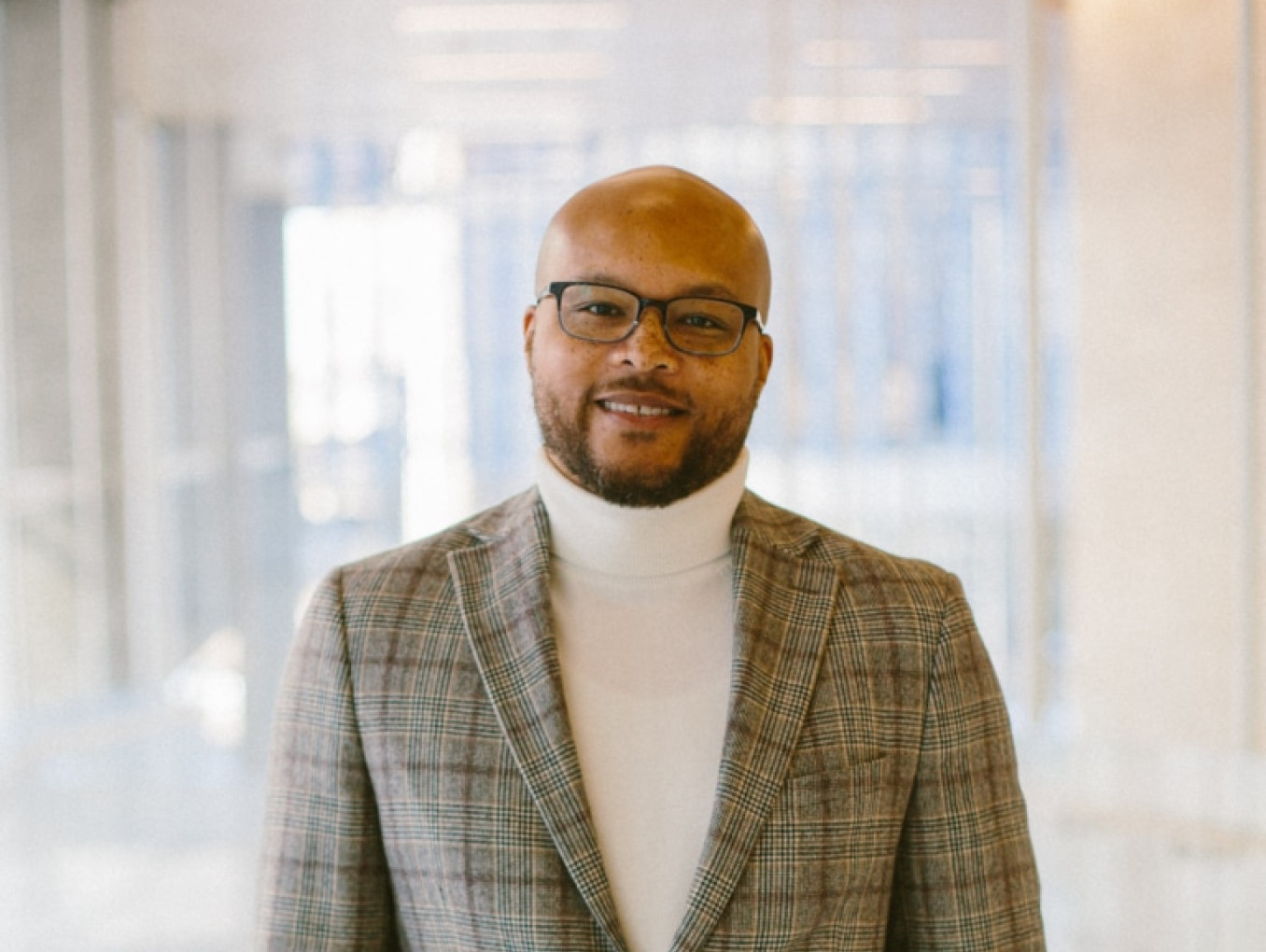

Brian K. Smith’s work counters structural injustice. As Director of Performance and Innovation for the City of Minneapolis, he is responsible for overcoming deep-seated mistrust between the state and the population and, in particular, for protecting the socially disadvantaged. In response to the aftermath of the 2020 murder of George Floyd, who was killed by police violence and whose case prompted a wave of protests, the city of Minneapolis launched public safety reform in 2021. In a pilot program, unarmed mental health professionals can be dispatched instead of police to de-escalate conflicts. Brian K. Smith is leading the program.


Brian K. Smith’s work counters structural injustice. As Director of Performance and Innovation for the City of Minneapolis, he is responsible for overcoming deep-seated mistrust between the state and the population and, in particular, for protecting the socially disadvantaged. In response to the aftermath of the 2020 murder of George Floyd, who was killed by police violence and whose case prompted a wave of protests, the city of Minneapolis launched public safety reform in 2021. In a pilot program, unarmed mental health professionals can be dispatched instead of police to de-escalate conflicts. Brian K. Smith is leading the program.
He brings more than 20 years of public and private professional experience. His background includes work in nonprofit management, county government, policy advocacy and reform efforts in juvenile justice, social services, health and education. Prior to assuming his new role, he served as president of the Institute on Culture and Policy, which is dedicated to eliminating racial and ethnic disparities through systems change and community engagement. Brian also served for five years as the Minnesota State Coordinator for the Juvenile Detention Alternatives Initiative, which is designed to provide reintegration into society for minor offenders.
“Creativity means everything to me. Often we do not reach our full potential because most bureaucrats are afraid to be creative. How can we achieve it? We have to listen to the people and get inspired by them as they are at the core of creativity that can inspire us.“ – Brian K. Smith
Award 2021
Tiaji Sio
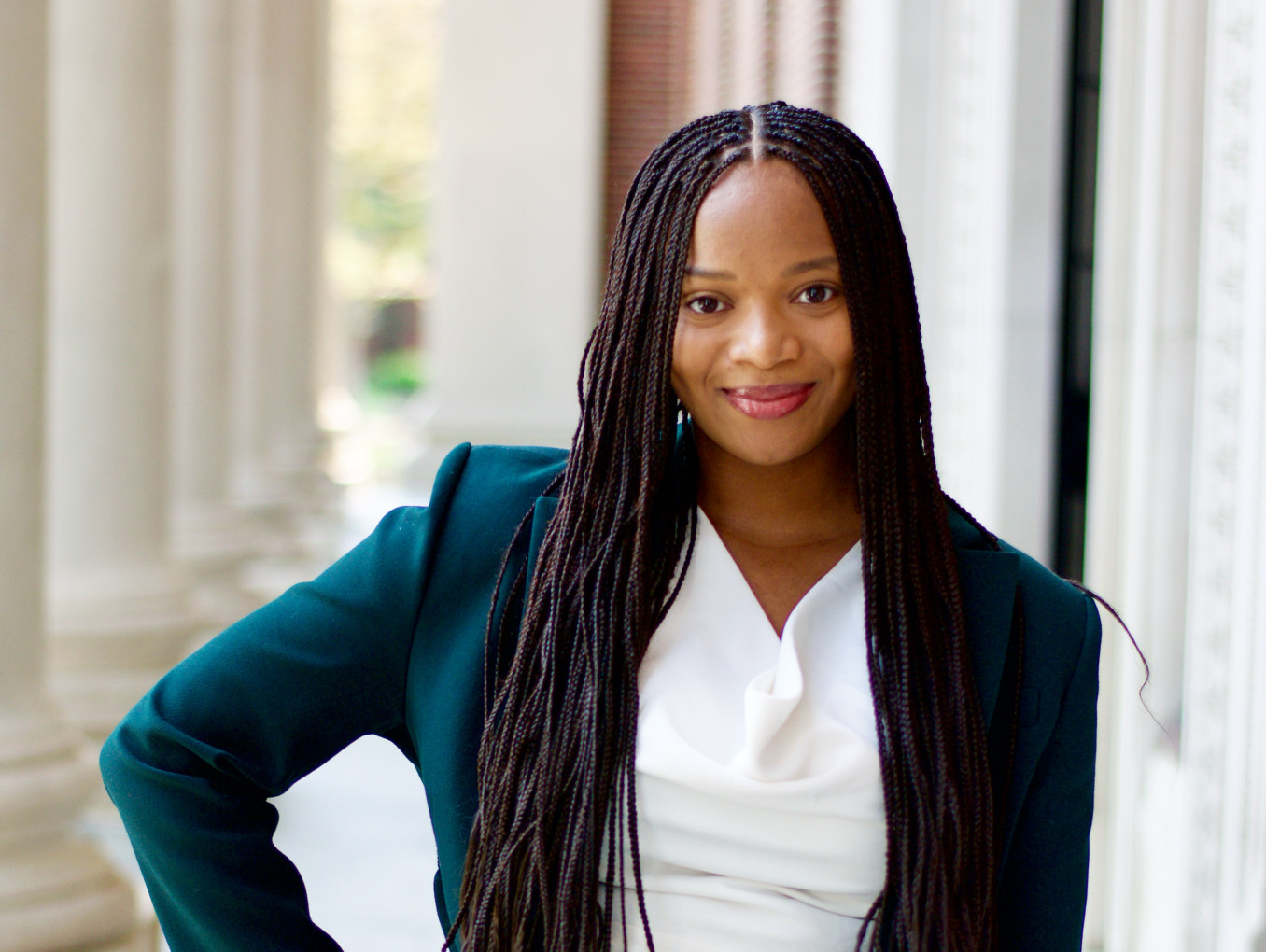

As the founder of the diversity network Diplomats of Color, Tiaji Sio is an essential driving force behind the anti-racism discourse in the Foreign Service.
Diplomats of Color currently has 150 members – as well as supporters such as the former Siemens CHRO, Janina Kugel and the German politician Aminata Touré. In 2019, Sio also headed the legal and consular department of the German Embassy in Senegal for two months and was able to enforce the acquittal of two wrongly imprisoned people.
For Tiaji Sio, seeing that her own actions make a difference in society is her greatest achievement.


As the founder of the diversity network Diplomats of Color, Tiaji Sio is an essential driving force behind the anti-racism discourse in the Foreign Service.
Diplomats of Color currently has 150 members – as well as supporters such as the former Siemens CHRO, Janina Kugel and the German politician Aminata Touré. In 2019, Sio also headed the legal and consular department of the German Embassy in Senegal for two months and was able to enforce the acquittal of two wrongly imprisoned people.
For Tiaji Sio, seeing that her own actions make a difference in society is her greatest achievement.
Hamdan Abdul Majeed
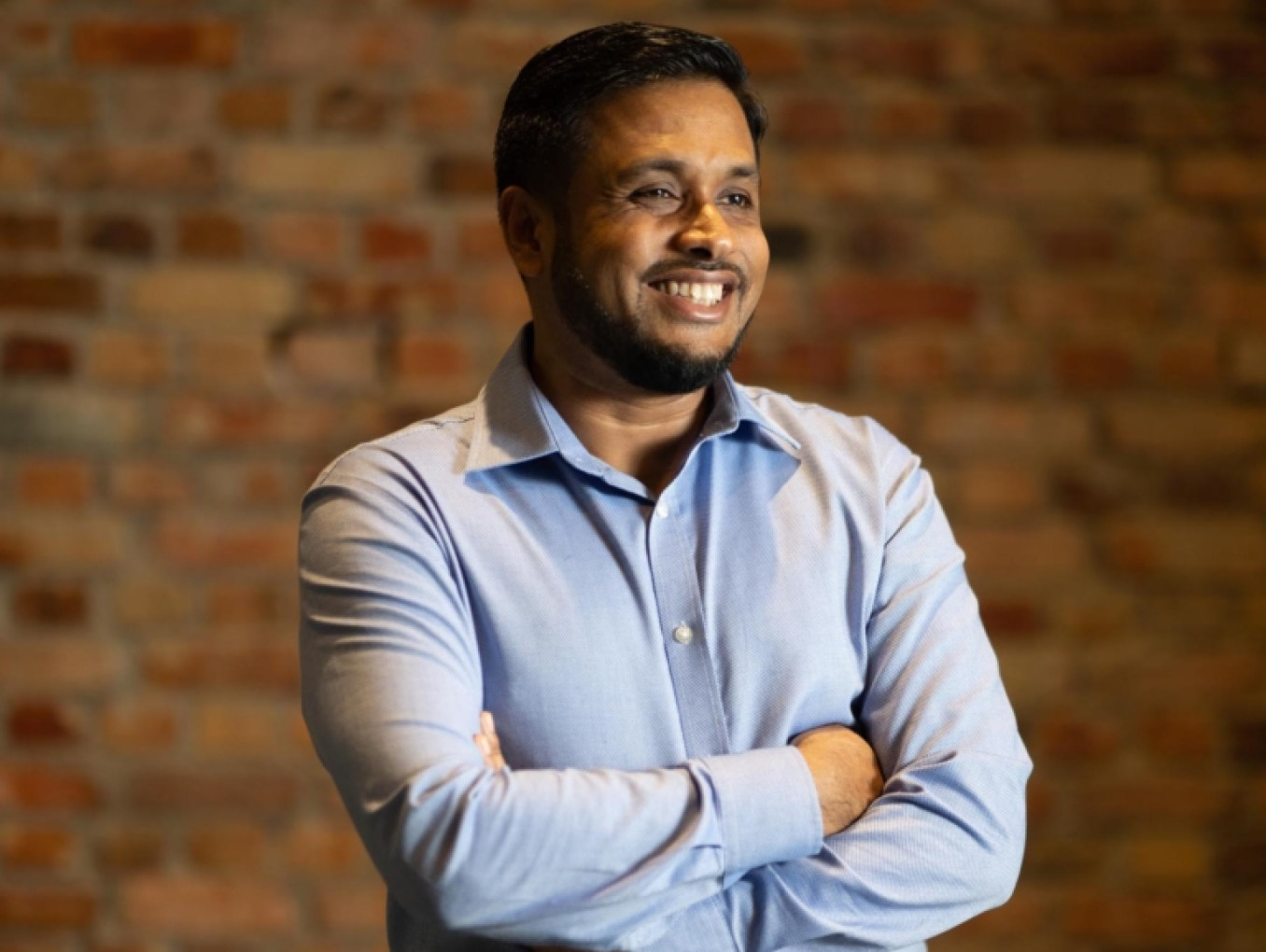

Hamdan Abdul Majeed is the Managing Director of Think City, a social purpose organisation with the mission of making cities more people-friendly, resilient and liveable. As a regional city making agency, Think City provides urban policy thinking, management and implementation of urban solutions, while advocating change in the way cities are planned, curated, developed, and celebrated. A subsidiary of Khazanah Nasional, the sovereign wealth investment arm of Malaysia, Think City’s work has reversed the decline of George Town, Penang, putting it on the international list of 10 Best Places to Visit. Think City now focuses on four areas of urban rejuvenation: Placemaking, Analytics, Resilience and Conservation encapsulated in Penang 2030, with the vision of a family-oriented, green and smart Penang. Majeed was formerly an investment banker and has an interest in the development of civil society in Malaysia, and the political economy of the Third World and Islamic Economics.


Hamdan Abdul Majeed is the Managing Director of Think City, a social purpose organisation with the mission of making cities more people-friendly, resilient and liveable. As a regional city making agency, Think City provides urban policy thinking, management and implementation of urban solutions, while advocating change in the way cities are planned, curated, developed, and celebrated. A subsidiary of Khazanah Nasional, the sovereign wealth investment arm of Malaysia, Think City’s work has reversed the decline of George Town, Penang, putting it on the international list of 10 Best Places to Visit. Think City now focuses on four areas of urban rejuvenation: Placemaking, Analytics, Resilience and Conservation encapsulated in Penang 2030, with the vision of a family-oriented, green and smart Penang. Majeed was formerly an investment banker and has an interest in the development of civil society in Malaysia, and the political economy of the Third World and Islamic Economics.
The Finnish Government & Demos Helsinki
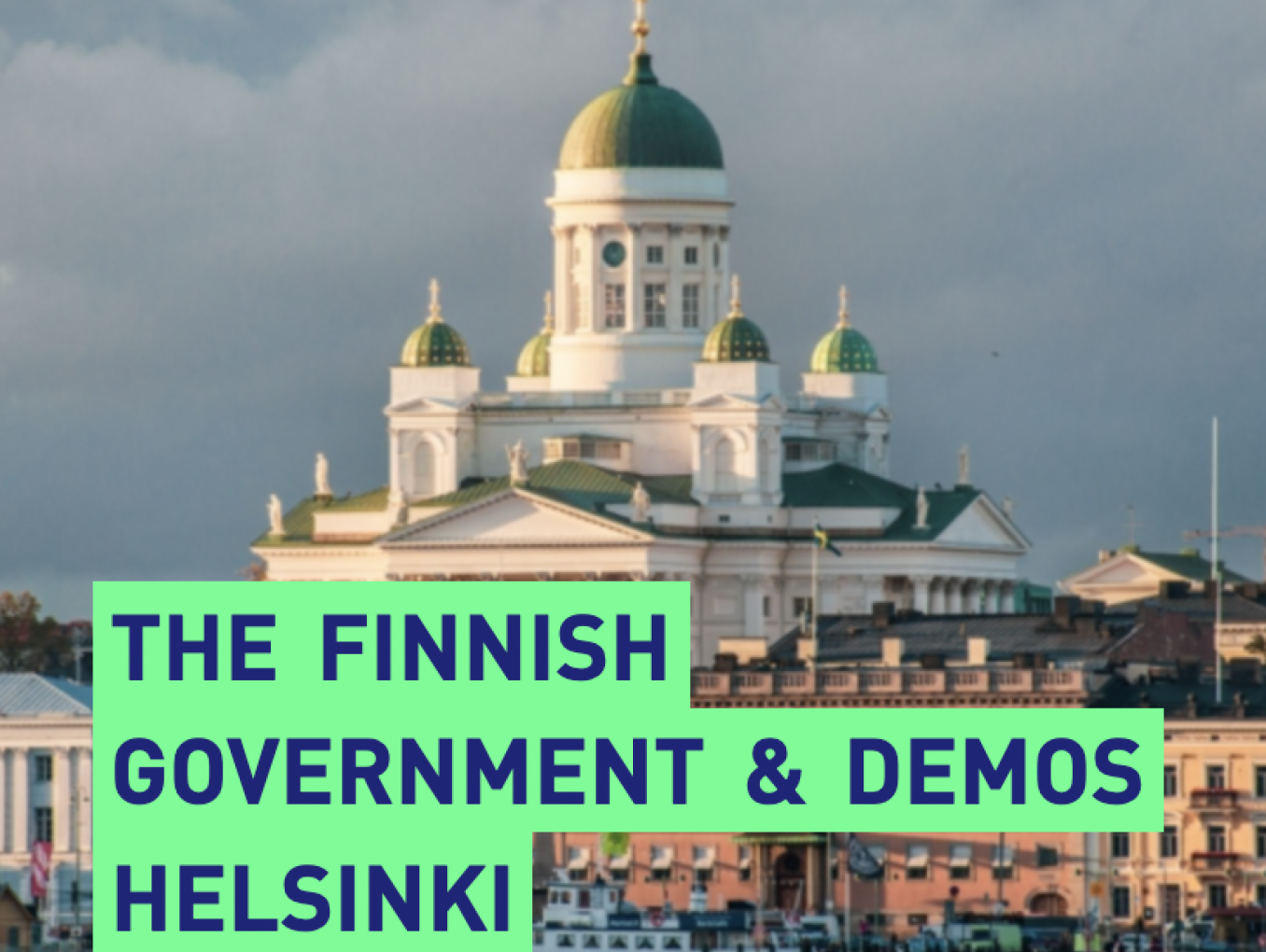

Finland’s Steering 2020 Initiative and Humble Government approach represent a paradigm shift in developing and implementing policy. It acknowledges the government’s fallibility. It argues that, when dealing with multifaceted problems characterized by uncertainty, we cannot know in advance how differing policy-solutions will play out in the real world. Instead, we must continuously investigate different options, experiment and test them where they will be implemented. Conventional policy-making requires strong consensus on how or when to start achieving a particular goal. It assumes we can successfully anticipate and steer the future. A humble approach, by contrast, allows actors to begin solving a problem as soon as they have reached a thin consensus on common directions and initial, exploratory approaches. A thin consensus is a shared understanding on the urgency of a particular problem. Agreement of broad goals allows them to be pursued and, circumstances permitting, the core values that underpin them. It requires trust.


Finland’s Steering 2020 Initiative and Humble Government approach represent a paradigm shift in developing and implementing policy. It acknowledges the government’s fallibility. It argues that, when dealing with multifaceted problems characterized by uncertainty, we cannot know in advance how differing policy-solutions will play out in the real world. Instead, we must continuously investigate different options, experiment and test them where they will be implemented. Conventional policy-making requires strong consensus on how or when to start achieving a particular goal. It assumes we can successfully anticipate and steer the future. A humble approach, by contrast, allows actors to begin solving a problem as soon as they have reached a thin consensus on common directions and initial, exploratory approaches. A thin consensus is a shared understanding on the urgency of a particular problem. Agreement of broad goals allows them to be pursued and, circumstances permitting, the core values that underpin them. It requires trust.
Award 2020
Rudi Dicks
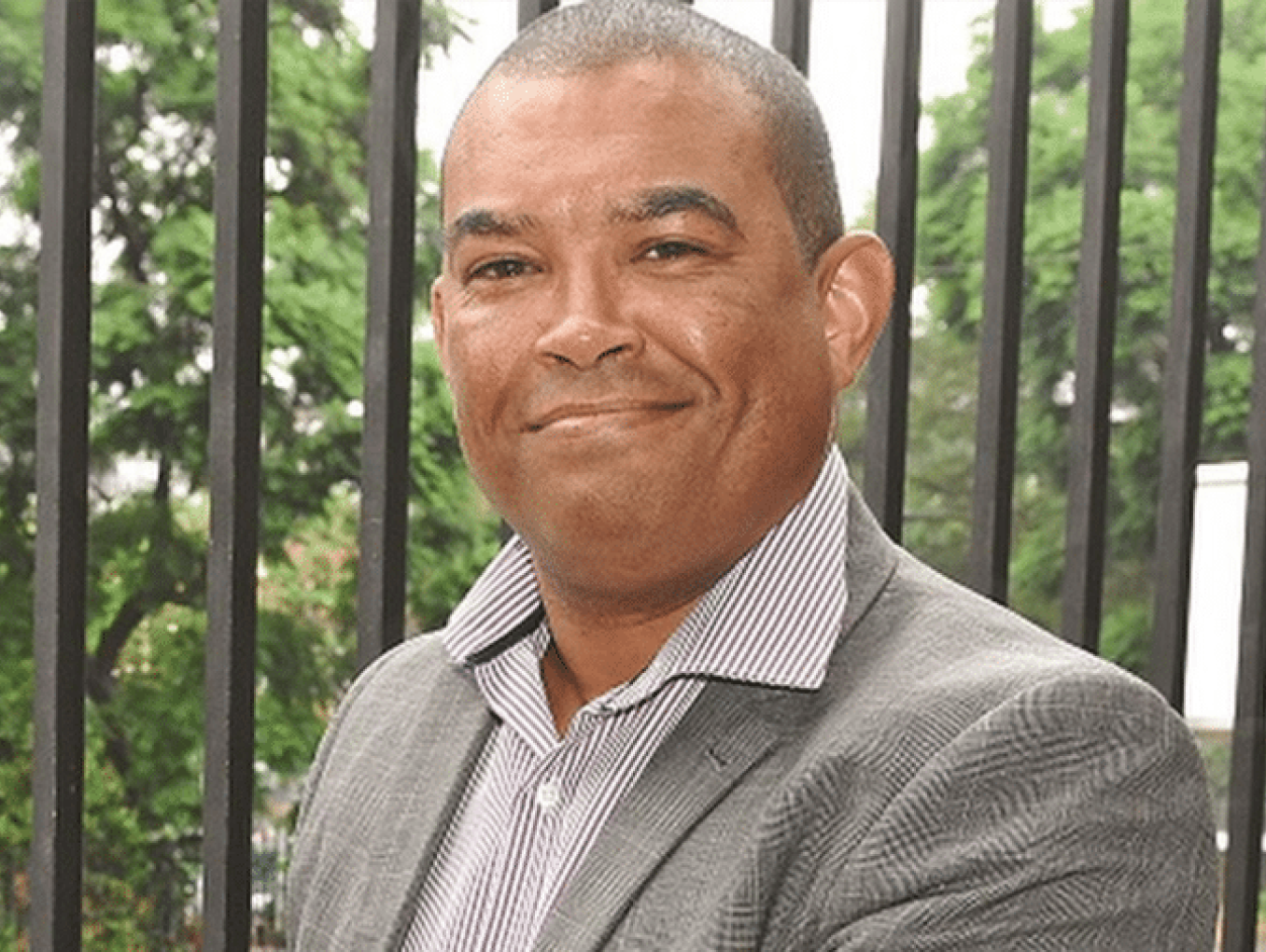

We are awarding the Creative Bureaucracy Festival Award 2020 to Rudi Dicks, who is head of the project management office in the private office of the South African president Cyril Ramaphosa. He has shown extra-ordinary dexterity and negotiation skills in brokering solutions by bringing together the country’s multiple partners from the public administration, the business and civic worlds and community. He is a real enabler, a fixer and an unblocker, such as organizing the Jobs Summit that created the country’s employment programme, fast tracking the widening of South Africa’s broadband by a few years, simplifying the water license system that previously had blocked investment and job creation.


We are awarding the Creative Bureaucracy Festival Award 2020 to Rudi Dicks, who is head of the project management office in the private office of the South African president Cyril Ramaphosa. He has shown extra-ordinary dexterity and negotiation skills in brokering solutions by bringing together the country’s multiple partners from the public administration, the business and civic worlds and community. He is a real enabler, a fixer and an unblocker, such as organizing the Jobs Summit that created the country’s employment programme, fast tracking the widening of South Africa’s broadband by a few years, simplifying the water license system that previously had blocked investment and job creation.
Lisa Witter & Robyn Scott
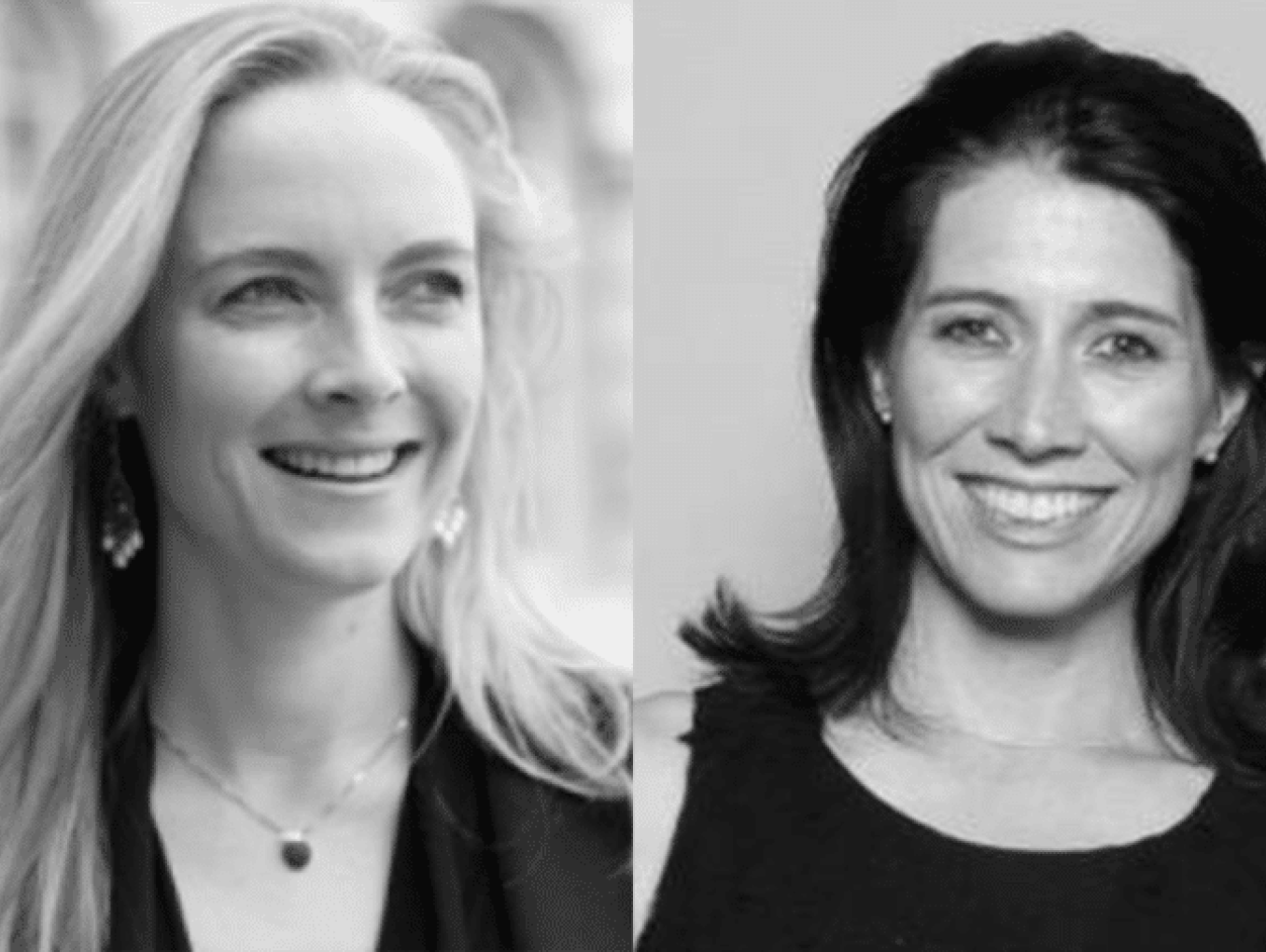

We are awarding the Creative Bureaucracy Festival Award 2020 to Robyn Scott and Lisa Witter who co-founded Apolitical in 2015. This astonishing organization has since created a network of 85,000 public servants from across the globe. Government is critical to solving global challenges and Apolitical seeks to bring 21st century learning and the best skills and solutions into it by helping public servants to connect and share knowledge and by being active in their global learning platform. This can give them a sense that they are part of a wider community of effective change makers working to solve the world’s hardest challenges in the common interest and for the public good.


We are awarding the Creative Bureaucracy Festival Award 2020 to Robyn Scott and Lisa Witter who co-founded Apolitical in 2015. This astonishing organization has since created a network of 85,000 public servants from across the globe. Government is critical to solving global challenges and Apolitical seeks to bring 21st century learning and the best skills and solutions into it by helping public servants to connect and share knowledge and by being active in their global learning platform. This can give them a sense that they are part of a wider community of effective change makers working to solve the world’s hardest challenges in the common interest and for the public good.
Christian Drosten
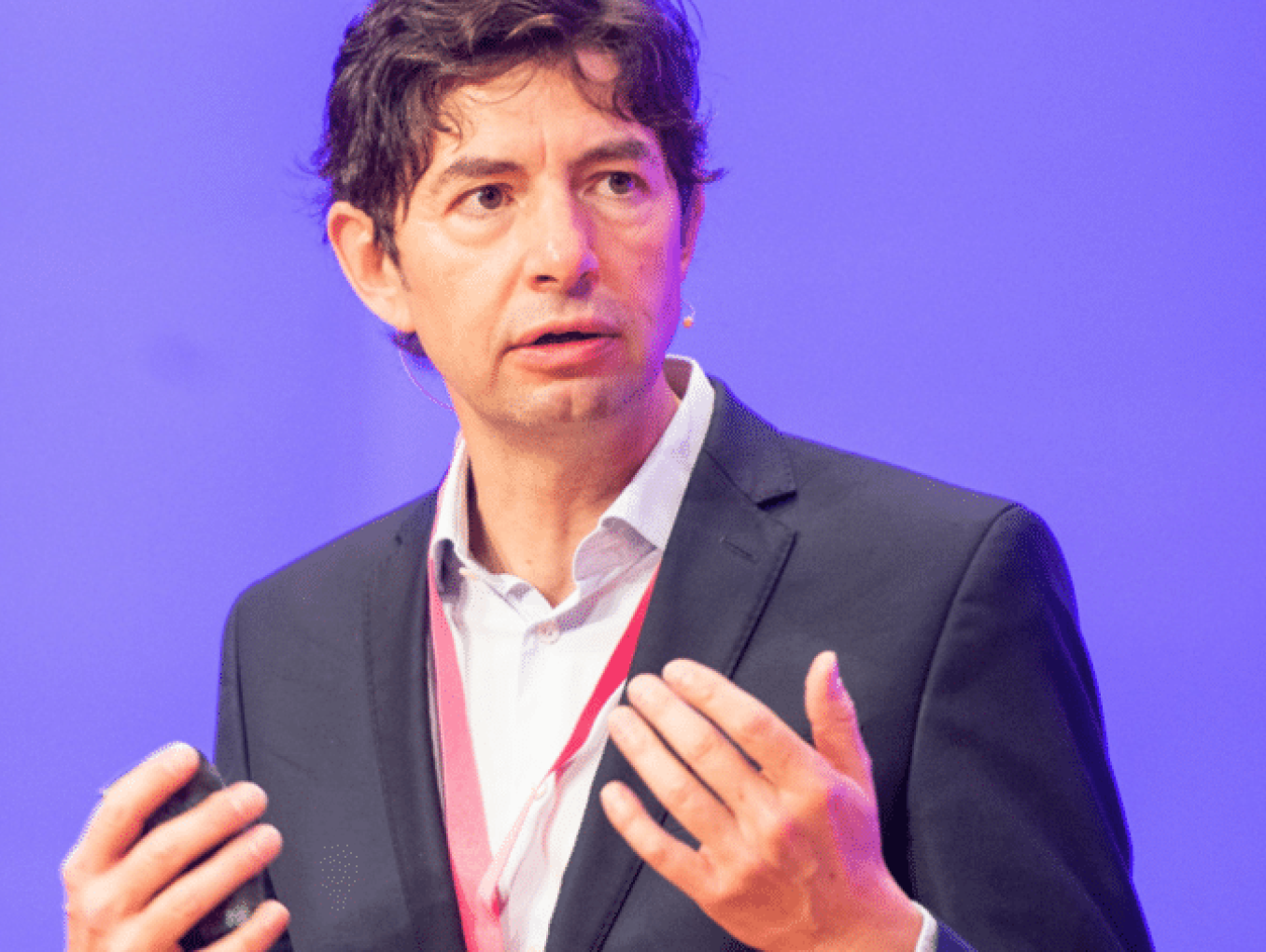

The Creative Bureaucracy Festival Award 2020 is awarded to a highly decorated scientist in public service – but not for his scientific contributions like the development of the first Corona virus testing that deserve highest recognition and certainly represent outstanding creativity. The Berlin virologist and Charité professor Christian Drosten is honoured for his public service in the public. Unlike many academics who shy away from popular media, Christian Drosten explained in great detail and with uttermost patience the details of research on the corona virus. He openly confessed what is still unsolved despite all academic effort and had the boldness to correct his positions in public, when new evidence surfaced. Christian Drosten contributed to a well informed public and trust in public institutions in challenging times.


The Creative Bureaucracy Festival Award 2020 is awarded to a highly decorated scientist in public service – but not for his scientific contributions like the development of the first Corona virus testing that deserve highest recognition and certainly represent outstanding creativity. The Berlin virologist and Charité professor Christian Drosten is honoured for his public service in the public. Unlike many academics who shy away from popular media, Christian Drosten explained in great detail and with uttermost patience the details of research on the corona virus. He openly confessed what is still unsolved despite all academic effort and had the boldness to correct his positions in public, when new evidence surfaced. Christian Drosten contributed to a well informed public and trust in public institutions in challenging times.
Award 2019
Amalia Zepou
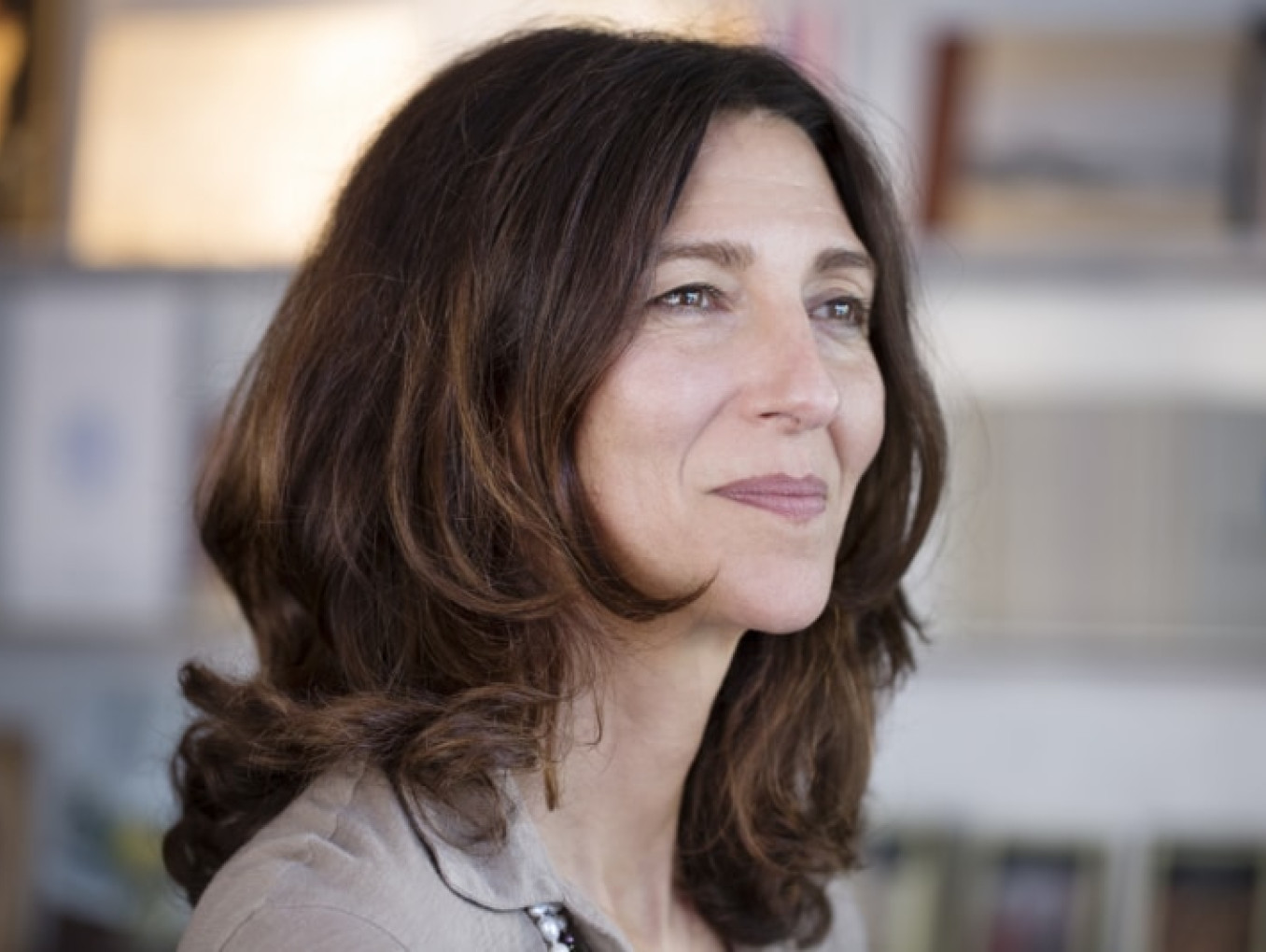

As a former Deputy Mayor for Civil Society and Innovation in Athens, she built the synAthina platform, which systematically mobilises citizens to participate in public problem-solving processes, initiating a “new era of social innovation,” according to the OECD.


As a former Deputy Mayor for Civil Society and Innovation in Athens, she built the synAthina platform, which systematically mobilises citizens to participate in public problem-solving processes, initiating a “new era of social innovation,” according to the OECD.
Geoff Mulgan


As a former government advisor and then Chief Executive of NESTA in the UK, he helped initiate and drive forward numerous government innovation projects worldwide. He is considered a leading expert in social and public innovation.


As a former government advisor and then Chief Executive of NESTA in the UK, he helped initiate and drive forward numerous government innovation projects worldwide. He is considered a leading expert in social and public innovation.
Daniel Zimmermann
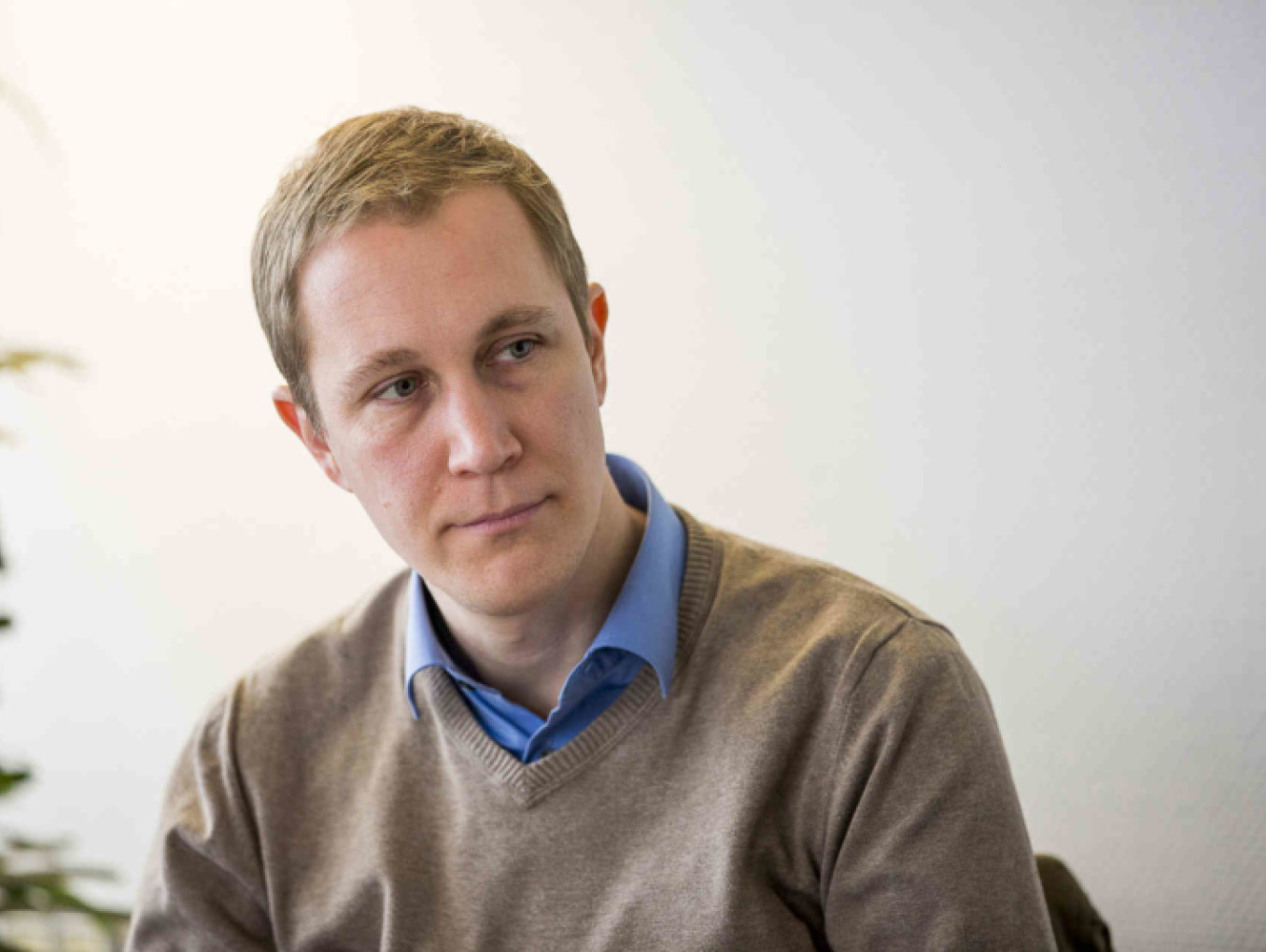

At the age of 27, he was elected mayor of the city of Monheim am Rhein in Southwestern Germany. Since he took office, he has become a role model for modern, citizen-centric, and pragmatic public management at the municipal level.


At the age of 27, he was elected mayor of the city of Monheim am Rhein in Southwestern Germany. Since he took office, he has become a role model for modern, citizen-centric, and pragmatic public management at the municipal level.
Award 2018
Jutta Weitz


An employee of the housing administration in Berlin-Mitte, Weitz gave vacant commercial spaces around the Auguststrasse area to artists and cultural professionals. Thanks to her commitment and foresight, the neighbourhood has become the art district we know today.


An employee of the housing administration in Berlin-Mitte, Weitz gave vacant commercial spaces around the Auguststrasse area to artists and cultural professionals. Thanks to her commitment and foresight, the neighbourhood has become the art district we know today.
Christian Bason
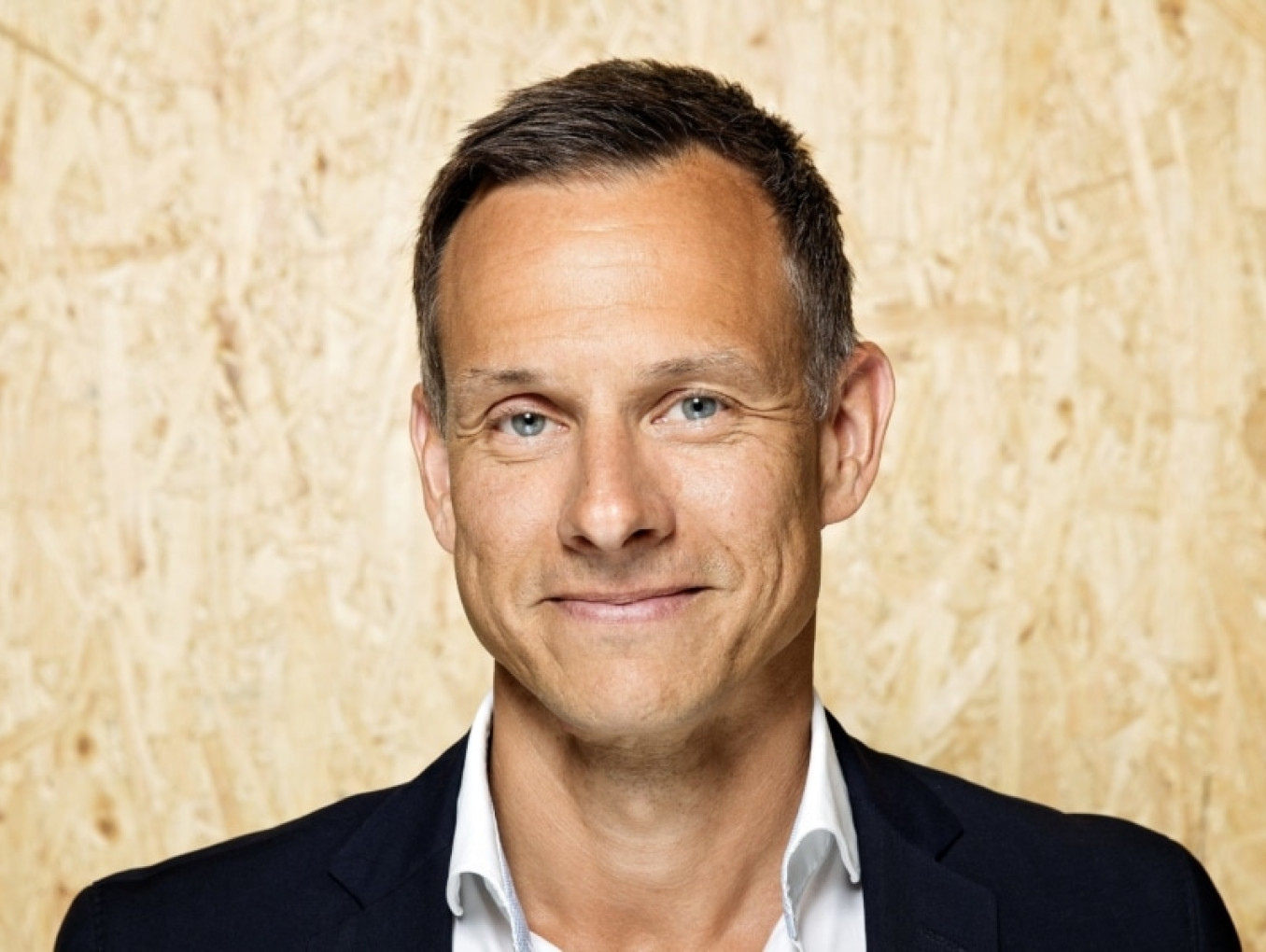

As director of MindLab, one of the first interministerial innovation labs worldwide, he advised the Danish government on the reform and renewal of the public administration – and has become a thought leader on helping governments better meet the need of their citizens.


As director of MindLab, one of the first interministerial innovation labs worldwide, he advised the Danish government on the reform and renewal of the public administration – and has become a thought leader on helping governments better meet the need of their citizens.
Gabriella Gomez-Mont
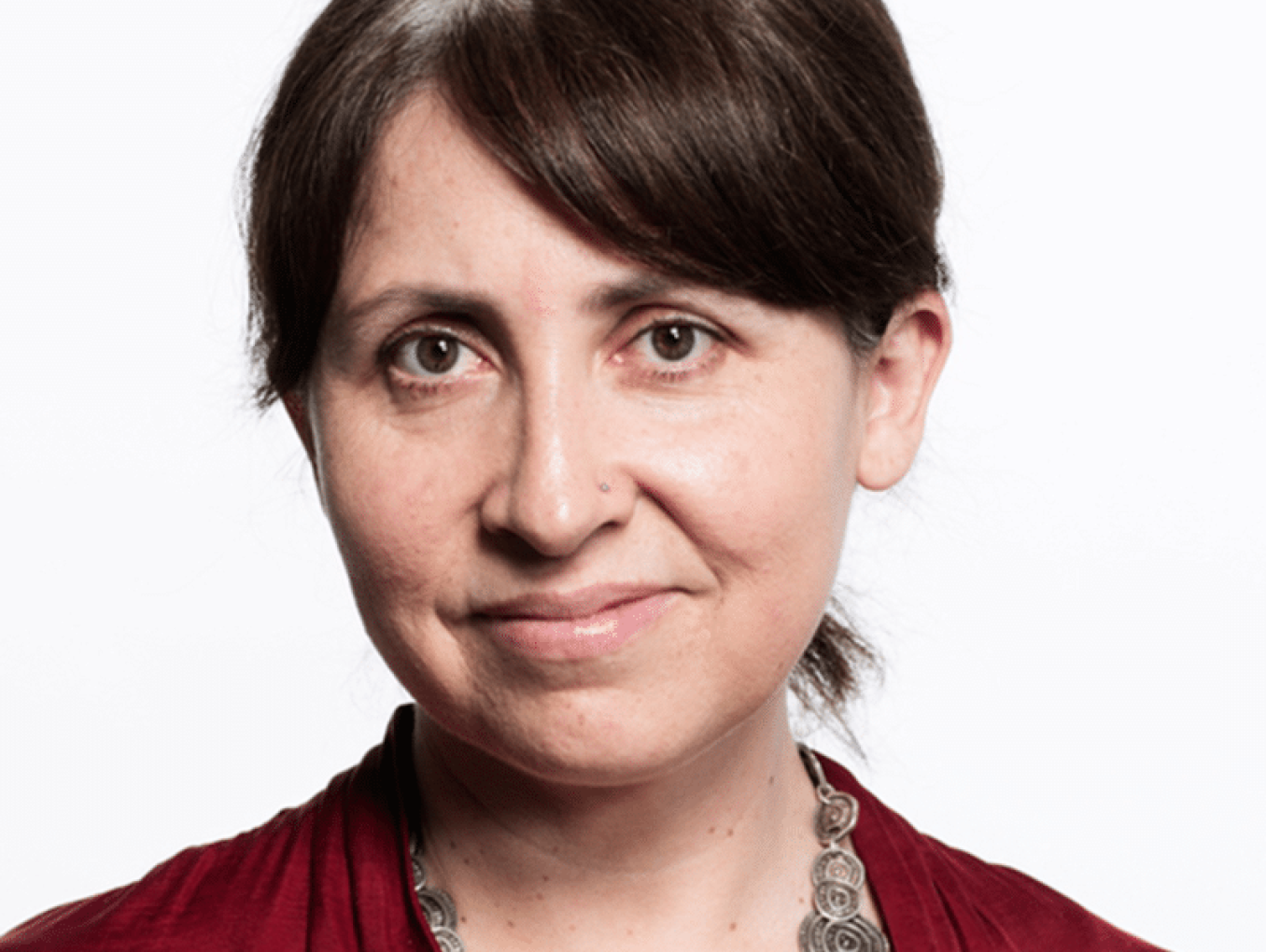

As head of the Laboratorio para la Ciudad innovation lab in Mexico City, she initiated projects such as “City for Children” in difficult neighbourhoods or crowd sourced a Mexico City constitution. Her experience as artist, documentary filmmaker and journalist helped her work.


As head of the Laboratorio para la Ciudad innovation lab in Mexico City, she initiated projects such as “City for Children” in difficult neighbourhoods or crowd sourced a Mexico City constitution. Her experience as artist, documentary filmmaker and journalist helped her work.